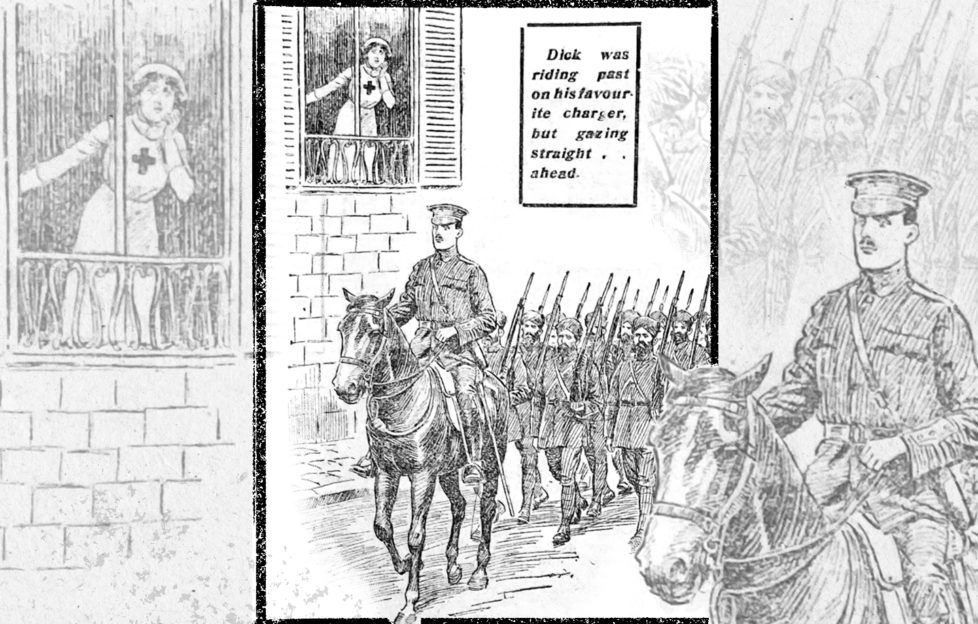
As we near Remembrance Day, we thought it would be a good time to share “Major Cameron’s Wife”, a story first published in “The People’s Friend” in 1915, when the hostilities of World War I were well underway.
Not only is it an interesting story, but it’s also an interesting look into the way writers, readers, and the staff of the “Friend” were thinking about — and representing — the war.
We’ve included the original illustration here, too, with some amendments from our Manon.
This story will be split into three parts, so keep an eye on your inbox!
Marjory Cameron was out of all patience when her husband appeared after keeping her waiting for nearly ten minutes.
She kept no count of the hours he had wasted waiting for her.
“I thought you were never coming, Dick,” she said pettishly. “And you’re not even in riding kit!”
“I’m sorry, dear,” he said quietly, “but I have come to tell you it is quite impossible for me to ride with you today. I have important work to do, and —”
Impatiently, his wife interrupted him.
“Work! Work! It is always work with you. I don’t count in your life at all. Nothing counts but the regiment!
“I wonder why you ever married me at all! I wish I had never married you!”
“Marjory!” There was anguish unspeakable in the utterance of her name, for Dick Cameron worshipped the pretty doll he had married, whose acceptance of his heart and hand had surprised no one more than himself.
“You don’t really mean that, darling!”
“I do,” she answered, almost sullenly. “I’ve known it for along time, though I never meant to tell you! But now that I have done so, I’m glad that you know!
“We’re not at all suited to each other. I hate India. If—if I stay here much longer, I shall learn to hate you!”
She was worn out, unstrung, quite incapable of weighing her words, but Dick — who had but little knowledge of women — believed they expressed her innermost thoughts.
A man wiser in the strange ways of her sex would have taken her in his arms, kissed her pouting lips, laughed her words to scorn.
Dick turned hastily aside that she might not see the agony in his eyes.
“If that is so, Marjory,” he said, very quietly, “you must go home with the first possible boat. Your mother will be glad to have you, and I daresay it will give her very real pleasure to say ‘I told you so’!”
He ended with a bitter laugh, which made Marjory wince.
“Dick, don’t!” she said sharply. “If mother foresaw something like this, it only proves that she was wiser far than her daughter! But I won’t go home. I can’t leave you here alone!”
Yet even as she spoke, her heart leaped at the mere thought of seeing all the dear home faces once again. For Marjory’s real malady was homesickness, and Dick, absorbed in the work which had been his life till he met her, had not done what he might to help her to endure and overcome.
They loved each other truly, yet for want of understanding, had drifted rapidly apart.
“I managed to live alone before we were married,” he said, curtly. “I have pretty nearly done so since.
“You’ve had your amusements, I’ve had my work. Thank goodness, I’ll have that still. After all, I believe you are right. Marriage was not for a man of my type!
“I have wronged you beyond repair. The least I can do now is to let you go back to the life that suits you. Fortunately, I have ample means to provide you with a suitable establishment at home if you find it impossible to live with your own people.”
“You—you mean that you want me to go home for good?” gasped Marjory. “I—I only thought of a holiday! We—we are man and wife, Dick, and—”
“The more’s the pity,” said Dick, savagely, finding a strange balm to his own wound in hurting her.
“I suppose you’re thinking of what the world will say! Well, I don’t care. You can tell any story you like — paint me as black as pitch if you feel it will make things any easier for you!
“Only don’t waste breath pleading with me to let you stay on. I wouldn’t keep you here now though my very life depended on it!”
And the young wife could only stand and stare at him in horrified amazement. This was indeed a new Dick from whom she would be only too glad to escape.
Afterwards he bitterly reproached himself, but the mischief had been done — on both sides. The cruel words spoken could not be recalled.
Within a week the two who loved each other sincerely had parted — it might be for years, it might be for ever — with no outward sign of regret from either husband or wife.
But when the great P. and O. liner had swung clear of the harbour, Marjory hurried down to her cabin — which he had engaged entirely for her — locked the door, flung herself on the couch, and burst into a passionate storm of tears.
“I—I love him,” she moaned, “more than father and mother and brothers and sisters all put together, and I have killed his love!
“He simply caught at the chance to get rid of me — the useless, incompetent wife who was nothing but a hindrance and a drag!
“Why, oh, why didn’t I try to keep and hold that which I had. Once lost, it can never be found again. The only comfort is that he will never know what I suffer!”
And Dick, driving back to the dreary bungalow from which the light had fled, had a shadow as of death itself in his eyes. His lips were set. His hands convulsively clutched the wheel of the big car as if it were his sole remaining support.
The native chauffeur by his side gave him but the one quick, understanding glance, then gazed straight ahead.
Mem-Sahib and Major-Sahib had parted coldly, but Ram Singh knew that two hearts were like to break.
It would not be for long, he reflected. They could not live without each other. He had not yet realised the strength of their pride.
Each was convinced that the love of the other was dead. Pride made both determine to keep their cruel knowledge from the world’s cold gaze.
The climate did not suit Marjory. That was the pleasant little fiction which everyone but the doctor accepted as the truth. And if Major Cameron was a little more silent, a little more grave, more certainly the slave of the regiment, the Mess agreed that all this was but natural in a man who, worshipping his young wife, had been forced to send her home.
The terrible agony of his hours of loneliness was known only to himself.
If Marjory’s gaiety in public was plainly a little forced, that, too, was but natural in a young wife compelled to leave an adored husband, and no one could guess how bitter were the tears she shed in secret.
Not even her mother dreamt that husband and wife had parted for good, and she was loud in her praises of Dick’s unselfishness in sending Marjory home for a long stay before they had been married a year.
For appearance sake, both wrote by every mail, but the cold, curt epistles were worse almost than none.
Marjory could not know with what difficulty Dick kept his pen from writing burning words of love — of pleading that she would come back to him, that they might commence afresh.
Dick little dreamt that Marjory poured her whole heart out in letters which were never posted, but the mere writing of which helped her more than she realised.
“He despises me as a useless doll,” she told herself. “He should have married a woman strong and capable like himself.”
And then one day there came to her the sudden determination to prove that she could do some useful work in the world, and she startled her mother by exclaiming —
“I’m sick to death of this purposeless, aimless life — this mere butterfly existence! I’m going to learn nursing.”
“My dear, that is quite impossible!” her mother said. “You have not the physical strength. And what would Dick say?”
Marjory winced.
“Dick would think I was doing something to justify my existence at last,” she answered quietly, yet there was that in her tone which gave her mother the first hint that all was not well between husband and wife.
“But I don’t mean to go right away to a hospital. I shall join the local branch of the Red Cross.”
“Oh, that is quite different,” answered Mrs Macfarlane. “That is quite the fashion in our set.”
And Marjory’s lip curled even as Dick’s would have done. She had not known till she had left him how much her ideas and opinions had been coloured by Dick’s.
There was not an ounce of snobbishness in big-hearted, large-minded Dick’s nature.
Marjory flung herself so heartily into this work that she obtained her certificates in the shortest possible time, but a strange fear that he might think it boasting kept her from telling Dick.
The news came to him in a roundabout way, and seemed yet another proof that he was now entirely outside her life.
“For she knew it would please me,” he thought. “Oh, what a fool I was not to keep that which I had won.”
Click here to read more of our fantastic Fiction content.
Click here to delve into our dramatic Daily Serial.




